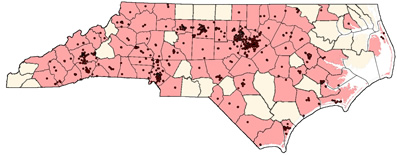North Carolina Opera, the company formed by the merger of Capital Opera Raleigh and the Opera Company of North Carolina, offered the second of two romantic concerts on Valentine’s Day night. The venue was the small, acoustically lively room at Peace College, the Sarah Graham Kenan Recital Hall. The stage was decorated with a vase of flowers on a small table and two potted palms on pedestals. The piano was offset to the left side; five chairs ranged off to the right, and a sixth was behind the keyboard. The six singers – Jennifer Aylmer and Megan Crosson, sopranos, Maria McDaniel, mezzo-soprano, Daniel Stein, tenor, Lane Johnson, baritone, Nicholas Nguyen, bass – were somewhat informally attired, and the program was for the most part light and appealing. Pianists Tad Hardin and Kathryn Lewis shared accompanying duties, performing together in the first set of Liebeslieder Waltzer by Brahms – the familiar set, cataloged as Op. 52, but misidentified in the program as Op. 23 which is a set of variations for piano four hands on a theme by Schumann. (The composer’s birth and death dates – 1833-97 – were also incorrectly given in the program and then incorrectly corrected from the stage.)
The musical line-up was attractive: the core of the evening was the aforementioned Brahms work, a collection of 18 pieces scored for SATB and piano duet (four hands). These were given sequentially but in three groups, interspersed with other vocal music. Five singers – all but Crosson – took part in the Liebeslieder, and the results were for the most part reasonably good, but it was worth checking the allocation of parts (given immediately above) because at the outset and from time to time throughout the performances it sounded a good bit as if the music had been written for soprano solo with three or four accompanying voices – balance, in other words, was often skewed by Aylmer, who’s sung at the Met and who was clearly the most experienced of the relatively young singers but who seemed incapable of reining in her large instrument in what is basically vocal chamber music. In fact, in this music, she overwhelmed her colleagues far too often – and overwhelmed the space and the audience, too. Otherwise, the performance gave considerable pleasure. The tempi tended to be brisk, so no moss grew on the felicitous tunes, and when they could be clearly heard the other singers demonstrated considerable technical and artistic skill.
The solo pieces on the program, however, gave the greatest pleasure, allowing as they did for the enjoyment of the individual singers in a wide range of material consisting of chestnuts and some less-familiar fare. In the first half, these offerings encompassed Fauré’s “Nell” (Op. 18/1), “Bist du bei mir,” S.508, attributed to Bach, and Obradors’ “Del cabello más sutil,” a folksong included in Dos cantares populares; and Grieg’s “Jeg elsker Dig!” (Op. 5/3), Richard Strauss’ “Ich trage meine Minne” (Op. 32/1), and Donaudy’s “O del mio amato ben,” from Arie di Stile Antico (1918-22). (We’re including the identifying information because it was omitted from the program.) The Fauré, Bach, and Obradors were sung by Johnson, a notable baritone heard to still greater advantage in the second part of the program, Aylmer and Stein (“Bist du…” being given as a duet), and Crosson, respectively. Aylmer was better in her solo numbers than in the Brahms ensemble, and she handled the Grieg song admirably. McDaniel was admirable, too, in the lovely Strauss piece, and Stein handled the old-fashioned-sounding Italian song with reasonable fluidity.
The second half was lighter still. Crosson led things off with Arditi’s “Il Bacio,” one of scads of Italian songs about – what else? – love. Poulenc’s “Les chemins de l’amour,” written as part of a set of incidental music for a play by Jean Anouilh, was beautifully realized by Aylmer in what was perhaps her best work of the evening. McDaniel returned for William Bolcom’s very cute and clever “Amor” (from Volume 1 of Cabaret Songs). A full-bore fusillade to love in its various forms then followed with Tom Lehrer’s “My Girl,” delivered a bit too straightforwardly by Nguyen; “I Wish I Were in Love Again” (from Babes in Arms, by Rodgers – whose name was misspelled in the program – and Hart), sung by Aylmer; Crosson’s winning rendition of Porter’s “In the Still of the Night” (from the soundtrack of the film Rosalie); and McDaniel’s restrained and very refined reading of Hoagy Carmichael’s “The Nearness of You” (1938). Johnson then returned for a gorgeous performance of Henry Mancini’s bittersweet “The Days of Wine and Roses,” from the 1962 Blake Edwards film of the same name. The grand finale was an arrangement of John Lennon’s “All You Need Is Love” for the entire ensemble plus piano duet accompaniment. The audience was encouraged to join in the fun, one byproduct of which is that all present may now claim to have sung with North Carolina Opera.
Aside from the problems with balance in the Brahms, this was a most enjoyable evening, introduced by the company’s general director, Eric Mitchko, and enlivened from time to time with remarks from the stage from artistic director Timothy Myers. The first performance, on Sunday afternoon, was said to have drawn a full house. Attendance was not so good on Monday evening, but then this was in fact the fourth Valentine-themed program in this venue in three days, the North Carolina Master Chorale having given its pair of annual romantic concerts there on February 12.
The next offering from NCO will be a semi-staged production of Gounod‘s Faust at the end of April. See our calendar for details.











